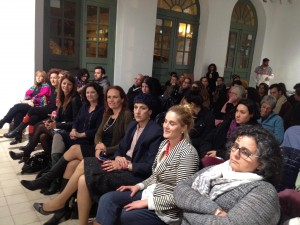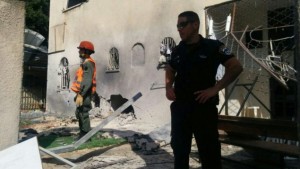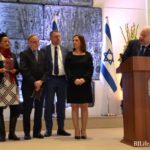For the past three years, ATZUM’s Task Force on Human Trafficking (TFHT) has worked to gain passage of legislation based on the Nordic Model, the international standard designed to criminalize the purchase of sexual services and protect the prostituted person, nearly always a girl or woman victim of childhood rape and/or incest. In February 2015, in partnership with the Association of Rape Crisis Centers in Israel, TFHT organized a panel discussion in which candidates for the upcoming Knesset (to be elected March 17) outlined their plans for addressing all forms of sexual violence, including prostitution and trafficking.
Eighty people came on a blustery winter night to attend the Jerusalem event billed as a “Hyde Park” discussion, referencing the iconic “Speakers’ Corner” in London. Candidates from nine parties of disparate political positions vying for Knesset seats participated, including:
Rachel Azaria (Kulano)
Dr. Anat Berko (Likud)
Ruth Colian (B’Zhutan)
MK Yifat Kariv (Yesh Atid)
MK Orly Levi-Abekasis (Yisrael Beitenu)
MK Shuli Moalem-Refaeli (HaBayit HaYehudi)
Ayelet Nahmias-Verbin (Zionist Camp)
MK Michal Rozin (Meretz)
Aida Touma-Sliman (The Joint List)
The candidates spoke of the need for the next Knesset to combat sexual violence and prostitution in Israel society. Indeed, multi-partisan collaboration will be key to ensuring that legislation is passed protecting girls and women from sexual servitude through prostitution. Notably, during the previous Knesset, TFHT successfully created an alliance of three MKs from different parties across the political spectrum firmly committed to advancing the Nordic Model.
Michal Leibel, lawyer and TFHT Director, said at the event: “The understanding that prostitution is a form of sexual violence and that it should be treated as such is now beginning to enter Israeli discourse. This leads to the only possible conclusion: to truly reduce prostitution, society must act as decisively against sex-buyers as against pimps.”

PHOTO. Hyde Park Event: Front row (right to left) MK Candidate, Aida Touma Sliman (the Joint List); Liat Klein, legal advisor of the Association of Rape Crisis Centers in Israel; MK Shuli Moalem-Refaeli (HaBayit HaYehudi); MK Yifat Kariv (Yesh Atid); MK Michal Rozin (Meretz) and MK Orly Levi-Abekasis (Yisrael Beytenu)
TIP Report
TFHT was invited to contribute to the U.S. State Department’s Trafficking in Persons (TIP) 2015 Report, a process which allowed us to share our concerns related to the policies and actions of the Ministry of Interior and its adjunct bodies, and their need to act further to protect victims of trafficking.
The annual TIP Report evaluates and ranks governments based on perceived efforts to acknowledge and combat human trafficking. The report assigns countries tiers according to compliance with standards outlined in the Trafficking Victims Protection Act. Israel should take pride in the progress made since 2001, when it received the report’s lowest ranking. Since then, with the help of NGOs such as ATZUM, various forms of trafficking, especially sex trafficking, have decreased.
Yet, while Israel has succeeded in drastically reducing sex trafficking originating in other countries, it has failed to address the prostitution that occurs within its own borders. This is clearly outlined in the 2014 TIP Report, which calls for the need for increased investigations of prostitution of Israeli nationals and stronger sentencing for convicted traffickers.








